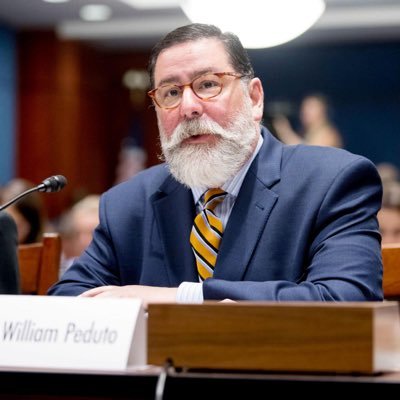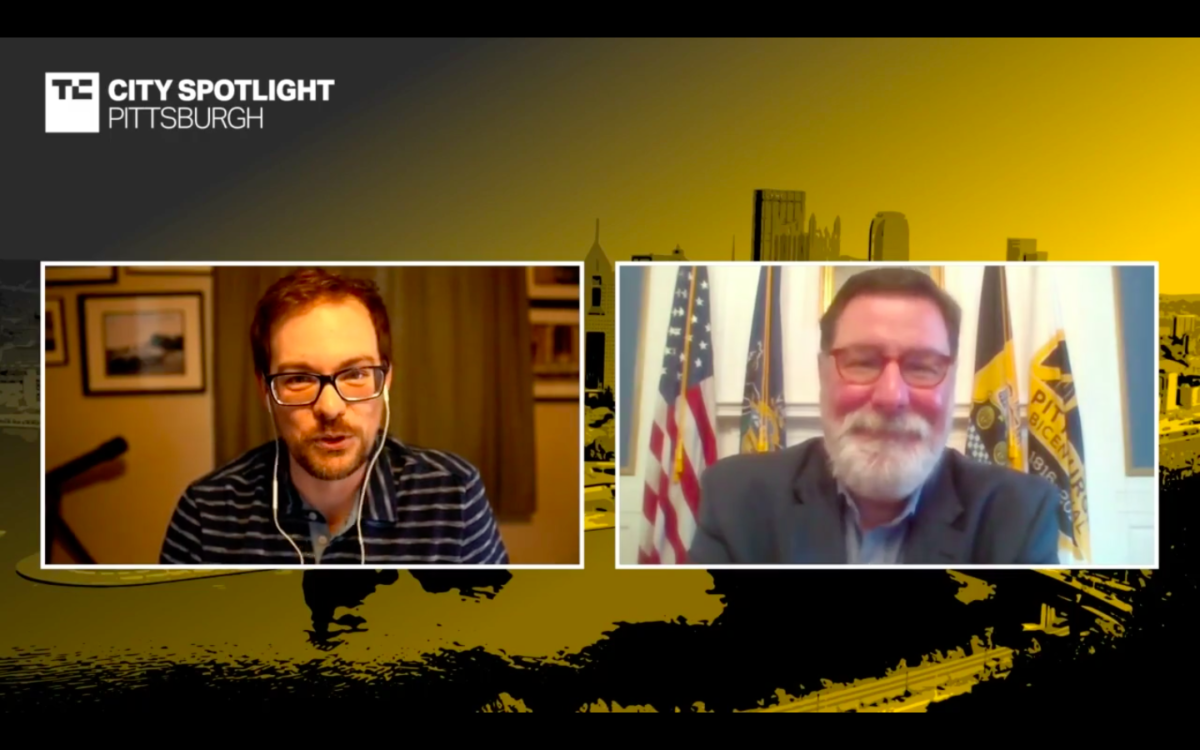The growth of Pittsburgh’s tech community has nationwide attention. Now leaders are taking a national platform to look at the next stage of growth.
On Tuesday afternoon, national tech news site TechCrunch hosted a City Spotlight events (virtually) for Pittsburgh. With a series of guest speakers, including Mayor Bill Peduto and Carnegie Mellon University President Farnam Jahanian, TechCrunch looked at the way Pittsburgh’s industrial past has and will continue to inform its tech future. Over 150 people attended the online event, with Pittsburghers and outsiders alike gathered on Hopin to learn more about to biggest trends and leaders in Pittsburgh tech.
TechCrunch managing editor Matt Burns kicked off the event by interviewing Peduto about the past decade of innovation in Pittsburgh. Mentioning the Pittsburgh Robotics Network meeting that had taken place earlier Tuesday morning, Peduto detailed the storied history of robotics and automation in the city.
“Looking in 1996, we created the National Robotics Engineering Center—NREC—in Pittsburgh, one of the first times… where it was a partnership between the corporate community, the universities, government philanthropic, in order to create it in Pittsburgh,” he said. “Ten years later, Red Whittaker and his team won the DARPA challenge for autonomous vehicles.”
Early innovators like Whittaker—who is also the founder of Manchester-based space robotics company Astrobotic—opened the door to younger talent in the city by choosing to keep their projects in Pittsburgh, said Peduto. Many of those projects have turned into companies that give the local talent pipeline from institutions like CMU or the University of Pittsburgh more options of places to work following graduation, he argued.
Nonetheless, Peduto acknowledged that despite ongoing growth of the tech ecosystem here, there remains a lack of venture capital to support companies as they advance. Though there is a healthy startup culture in Pittsburgh right now, he thinks that entrepreneurs frequently miss out on “that critical second wave of funding.” That limits the amount of startups that can take their business to the next level.

Pittsburgh Mayor Bill Peduto. (via Twitter)
“Without that second round of funding, a lot of these companies die on the vine instead of being able to make it to a critical juncture,” he said.
Still, Peduto has faith that the recent de-emphasis on work location paired with increasing depth and breadth in the local tech industry will start attracting more investors to the city. But even until then, he thinks some of Pittsburgh’s most prominent founders like Duolingo’s Luis von Ahn have stayed here simply because they love it. In the earlier days of that company, Peduto said von Ahn and his team “had a lot more opportunity and probably a lot more money to be able to leave Pittsburgh than to stay in Pittsburgh and create his vision. But he did it partly because of a pride in being part of the city.”
Speaking of the prominent East Liberty language learning company, also featured at Tuesday’s event was Karin Tsai, Duolingo’s director of engineering, in a pre-recorded interview that was completed before the company entered a quiet period in advance of their upcoming IPO. While the conversation focused mostly on the company’s approach to A/B testing and internal decision-making processes, she also spoke about the importance of the company’s mission statement, and how she sees it as a driving force in recruiting talent to the company.
“I think what has definitely remained [since Duolingo’s founding] is the mission driven-ness of the company. I think from the beginning, people joined Duolingo, because they really believed in the mission of bringing high quality education to the world,” Tsai said.
Following the Duolingo interview was a final conversation with Jahanian about the role CMU has played in pushing innovation forward in Pittsburgh. Mentioning the university’s Swartz Center for Entrepreneurship, Innovation Scholars program, Corporate Startup Lab and other resources, Jahanian said that CMU wants its students to not only have easy access to launch startups themselves, but to take those resources with them to any job after graduation.
“Whether you end up working for a larger company or launch your company, we want you to approach life and problem solving and your career with an entrepreneurial mindset,” Jahanian said.
However, Jahanian echoed Peduto’s point on a somewhat lacking support network across Pittsburgh’s tech ecosystem to elevate startups to the next step.

CMU President Farnam Jahanian
“You need a lot more than just cool technologies, or new research ideas, or new, essentially concepts and products to launch a company,” he said. “You need a lot more around it—you need marketing, you need product management, you need to be able to develop a business plan.”
While he argued that CMU helps provide a lot of those business resources to students and faculty, Jahanian wants to see the ecosystem bring in the other expertise that can help startups grow.
“You need to have private funding, you need to have a rich talent workforce, not just engineering and product development, but also in marketing and product management and various sorts of business functions for the company,” he said. “I think those are some of the areas, to be really candid, where Pittsburgh needs to do more.”
Closing out the event was a short pitch showcase of three local startups, including surgical stroke monitoring machine learning startup Reade.AI, biodegradable teeth-cleaning gum company Trek Gum and autonomy insurance company Koop.ai. Also pitching was a fourth wildcard pick from the live audience: high school internship talent network Slingshot.
Sophie Burkholder is a 2021-2022 corps member for Report for America, an initiative of The Groundtruth Project that pairs young journalists with local newsrooms. This position is supported by the Heinz Endowments.Before you go...
Please consider supporting Technical.ly to keep our independent journalism strong. Unlike most business-focused media outlets, we don’t have a paywall. Instead, we count on your personal and organizational support.
Join our growing Slack community
Join 5,000 tech professionals and entrepreneurs in our community Slack today!

The person charged in the UnitedHealthcare CEO shooting had a ton of tech connections

From rejection to innovation: How I built a tool to beat AI hiring algorithms at their own game

The billion-dollar creator industry hits Pittsburgh — and disrupts the innovation economy


